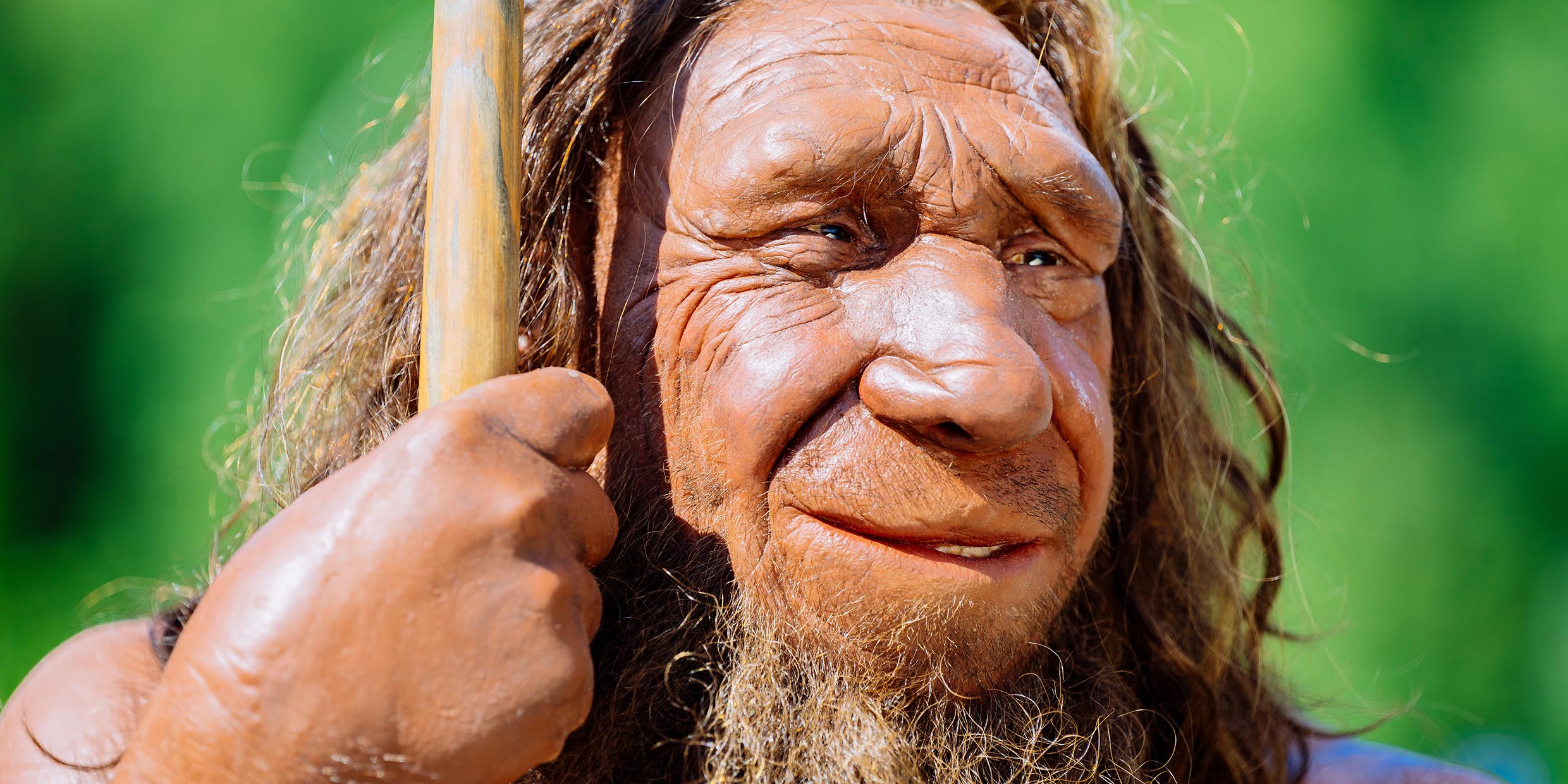Originally published 18 September 2005
Pity the poor Neanderthals, who had the misfortune of being discovered at the time Darwin was evoking the outrage of his contemporaries by suggesting that humans, apes, and gorillas have a common ancestry.
The fossilized bones of Neanderthals were first excavated in the middle of the 19th century. The bones were undeniably human, but distinctly different than those of modern men and women. The stocky limbs and heavy, slanted brows suggested a gorilla-like ancestor that no one warmly welcomed to the human family tree.
In The Outline of History, published in 1920, H.G. Wells promoted the view that a dim racial remembrance of the Neanderthals may survive in folklore stories of ogres. He assumed that the first modern humans did not interbreed with Neanderthals, and attributed this separateness to the Neanderthal’s “extreme hairiness,” “ugliness,” and “repulsive strangeness.”
An illustration in Wells’ book shows a sour and simian Neanderthal male with dull, squinty eyes. “Its thick skull imprisoned its brain, and to the end it was low-browed and brutish,” wrote Wells, using the impersonal pronoun. In this version of prehistory, which for a long time was shared by scientists, the triumph of modern humans over Neanderthals was the triumph of reason, imagination, and lofty moral vision over ugliness, stupidity, and amorality.
More recent evidence from the field tells a rather different story.
Recovery of mitochondrial DNA from a Neanderthal skeleton suggests that Neanderthals and modern humans diverged from a common stock at least half a million years ago, probably in Africa, then evolved along parallel lines. Ancestors of Neanderthals eventually arrived in Europe and western Asia, where they thrived near the margins of ice age glaciers. Apparently, they made stone tools, clothing and shelter, used fire, decorated their bodies with ornaments, and at least occasionally buried their dead. There is circumstantial evidence that they cared for the aged and handicapped. Their brains were as capacious as our own.
Then, around 40,000 years ago, their territories were invaded by Cro-Magnons, our immediate Homo sapiens ancestors. For thousands of years the two branches of the human family lived side by side. There is no convincing evidence of interbreeding; they may have been separate species, unable to produce offspring. For one reason or another, Neanderthals were slowly driven to extinction; their last redoubt seems to have been the southern part of the Iberian Peninsula.
Certainly, the Neanderthal extinction is one of the large dramas of human history — a devastating instance of deliberate or accidental intraspecies genocide — and certainly the most momentous loss of biodiversity ever caused by Homo sapiens.
History is written by the winners, as Ian Tattersall, Curator of the Department of Anthropology at the American Museum of Natural History in New York, reminds us in his book The Last Neanderthal (1995). The story of Neanderthals is written by Cro-Magnon descendants for an audience of Cro-Magnon descendants. Neanderthals were losers, and there is no more irrevocable way of losing than extinction. When Wells presented Neanderthals as “ugly” and “dim-witted” he was merely doing what winners have often done. Virtually all people in all times have considered those outside of tribe or kin as somehow inferior.
History may be written by the winners, but winners can change what they write. An update on Wells’ reconstruction of a Neanderthal face can be found in Tattersall’s book. This new fellow has wide, curious eyes and a slightly bemused expression. He could be anyone’s kindly grandfather. Put him in a plaid shirt and pair of overalls and he would not attract all that much attention as a fellow passenger on a crosstown bus.
Tattersall’s sympathetic view of Neanderthals is typical of the current generation of anthropologists. His account is laden with inference, as all anthropology must be, but he goes out of his way to avoid prejudicial language and puts the most generous spin on the evidence. In Tattersall’s account, the brutish subhumans of Wells’ story give way to a people who are the gentle, intelligent victims of Cro-Magnon violence.
This change of opinion is at least partly driven by a sea change in the way we value alien cultures — the same transformation that led to a reevaluation of the role of Columbus and his contemporaries from religious saviors of savages to exterminators of a less technologically endowed people.
The Cro-Magnon invaders of Europe probably never questioned their right, even obligation, to kill the indigenous — and alien — Neanderthal inhabitants of those lands. It was kill or be killed, and Cro-Magnons presumably possessed the better technology. Evolution is a story of never-look-back competition, red in tooth and claw. Humans, alone of all species, do sometimes look back. We cultivate a sense of history. We ask ethical questions about past actions.
Of course, it is hardly fair to impose contemporary moral standards upon our ancestors, especially those of the very distant past, but in asking ethical questions about human history, and in revising answers, we redefine ourselves. I once heard the anthropologist Margaret Mead say that the progress of civilization is the ever widening circle of those whom we do not kill. Perhaps we have at last become civilized enough to recognize the injustice of exterminating a people who may have been a separate species, but who were nevertheless an intelligent, cultured part of the human family. Alas, our enlightenment comes too late for the Neanderthals.



